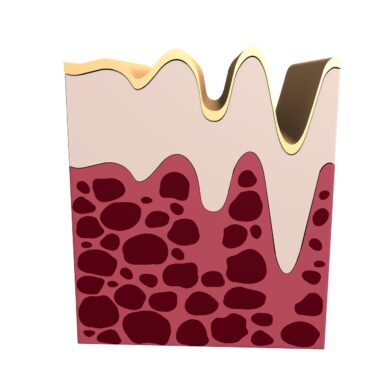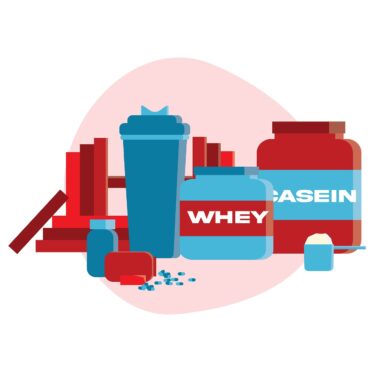Supplements That Help Reduce Muscle Soreness and Fatigue
For athletes and fitness enthusiasts, muscle soreness can significantly impact training and performance. It is essential to consider specific supplements that alleviate soreness and accelerate recovery. Some effective supplements for reducing muscle soreness include branched-chain amino acids (BCAAs), which help in muscle repair and reduce exercise-induced fatigue. Another beneficial supplement is curcumin, derived from turmeric, known for its anti-inflammatory properties. Additionally, beta-alanine is helpful in combating fatigue, enhancing endurance by buffering lactic acid in muscles. Fish oil supplements, rich in omega-3 fatty acids, are also crucial due to their anti-inflammatory effects, promoting overall recovery. Remember to consult with a healthcare professional before starting any new supplement regimen. Proper dosage and timing can maximize the benefits of these supplements, ensuring optimal performance and recovery. Besides supplements, maintaining proper hydration and nutrition is vital. Consuming a balanced diet with adequate protein, carbohydrates, and healthy fats supports muscle recovery alongside supplementation. Overall, using the right supplements can lead to enhanced performance by minimizing muscle soreness and fatigue effectively.
Another critical supplement for enhancing recovery is glutamine, an amino acid that aids in reducing muscle soreness and supports immune function. While your body produces glutamine naturally, its levels can deplete after intense workouts. Therefore, supplementing with glutamine can help replenish these levels, aiding in muscle recovery. Electrolytes also play a crucial role in post-workout recovery. They help maintain fluid balance and muscle contractions, minimizing the risk of cramping and soreness. Effective electrolyte supplements often include sodium, potassium, and magnesium to support muscles during intense training sessions. Citrulline malate is another supplement gaining popularity, known for enhancing blood flow and nutrient delivery to muscles during exercise. Moreover, creatine can also be beneficial, improving energy availability and potentially reducing muscle soreness after workouts. Always combine these supplements with a comprehensive fitness regimen. While supplements support muscle recovery, essential nutrition, proper hydration, and effective training strategies must not be overlooked. Listen to your body to determine the best combination of supplements and practices that work for you, promoting efficient recovery and optimal performance.
The Role of Hydration in Muscle Recovery
Staying hydrated is vital for muscle recovery and reducing soreness after workouts. Dehydration can exacerbate muscle fatigue and soreness, slowing down the recovery process. Therefore, it’s crucial to drink plenty of water before, during, and after training sessions. Incorporating sports drinks that contain electrolytes can also be beneficial for replenishing lost minerals. Additionally, electrolytes help maintain balance in muscle cells, reducing the risks associated with fatigue and soreness. It’s recommended to consume fluids that combine water and electrolytes, especially after intensive workout sessions. You can also include foods with high water content, such as fruits and vegetables, in your diet to boost hydration levels naturally. Consuming fluids right after your workout can further help in speeding up recovery by facilitating nutrient delivery to the muscles. Moreover, the timing of hydration also plays a significant role; often, it’s better to hydrate continuously rather than waiting until after workouts. Incorporate these hydration strategies into your routine for optimal recovery from muscle soreness following strength training sessions, and identify what specific hydration strategies work best for your personal training needs.
Nutrition also plays a vital role alongside supplements when aiming to reduce muscle soreness and fatigue. A well-balanced diet rich in antioxidants can assist in minimizing inflammation. Foods like berries, leafy greens, and nuts are high in antioxidants and should be consumed as part of a regular diet. Moreover, timing your meals post-workout can optimize recovery significantly. Consuming a meal rich in protein and carbohydrates shortly after exercise helps replenish glycogen stores and provides the necessary building blocks for muscle recovery. Leucine, an amino acid found in protein-rich foods, triggers muscle protein synthesis, vital after strenuous workouts. Foods such as chicken, eggs, and legumes are excellent sources of protein and need to be considered in your post-workout nutrition. Also, consider including complex carbohydrates in your meals as they provide sustained energy, preventing fatigue. A combination of protein and complex carbohydrates can further ensure optimal recovery by restoring energy levels and aiding muscle repair processes. Strive for a nutrient-dense meal post-workout to enhance your recovery dramatically and to minimize muscle soreness effectively.
Importance of Sleep for Recovery
Rest and recovery are as important as the workouts themselves. Quality sleep is vital for muscle recovery and reducing soreness efficiently. During sleep, the body undergoes numerous physiological processes that repair muscles and restore energy levels. Insufficient sleep can lead to increased muscle soreness and impaired recovery, negatively affecting your overall performance. Developing a consistent sleep routine is essential; aim for seven to nine hours of quality sleep each night. Consider creating a conducive sleep environment, free from distractions, to improve your sleep quality. Additionally, incorporating relaxation techniques like stretching or meditation before bedtime can help you wind down better. Limit caffeine and electronic device usage in the evening; these may hinder the sleep cycle. Furthermore, consider taking short naps if you feel fatigued. Short sleep periods can help boost overall performance and enhance recovery when necessary. Focusing on quality sleep alongside nutrition and supplementation creates a comprehensive recovery plan, keeping muscle soreness and fatigue at bay.
Another aspect to consider in recovery is the timing of your supplement intake. Post-workout supplementation is significant because your muscles are primed for recovery shortly after exercise. Consuming BCAAs or protein shakes directly after workouts can help jump-start the recovery process. Timing can help in capitalizing on the anabolic window, allowing maximum absorption of nutrients. Most research suggests this anabolic window is optimal for about 30-60 minutes post-exercise. However, it’s essential to listen to your body and adapt your intake based on how you feel. Additionally, splitting up protein intake throughout the day aids muscle recovery and helps you maintain optimal muscle protein synthesis, which is vital after strength training. Supplementing at regular intervals (every three to four hours) can help sustain amino acid levels in your bloodstream. Combining various strategies—such as proper hydration, balanced nutrition, and appropriate supplement timing—allows for an effective muscle recovery strategy. Adopting these practices will lead you to witness a considerable decrease in muscle soreness and enhanced performance during your workouts.
Conclusion: Comprehensive Approach to Muscle Recovery
In summary, reducing muscle soreness and fatigue requires a multifaceted approach. Including supplements such as BCAAs, curcumin, and glutamine, along with adhering to a well-balanced diet, plays significant roles in recovery. Additionally, proper hydration, quality sleep, and the timing of supplement intake are crucial components that should not be overlooked. By integrating these strategies into your routine, you can achieve more efficient recovery and maintain performance levels in your strength training regimen. Don’t forget to customize your recovery plan based on your unique body responses. Listening to your body’s signals is vital for understanding what works best for you. Emphasizing recovery alongside training will inevitably lead to better results in your fitness journey. Continue exploring and finding the right combinations of supplements and techniques that work for your individual needs, fostering long-term success and wellness.
For further guidance and tailored advice, consider consulting a sports nutritionist who can provide personalized recommendations based on your specific goals and requirements. They have the expertise to distinguish what supplements will offer you the best advantages while minimizing the chances of experiencing side effects. Additionally, remaining informed about new research and trends in sports nutrition can equip you with the knowledge to make better dietary choices. There’s a wealth of information available, ensuring you stay updated on the most effective supplements and nutritional approaches. Staying engaged with your health and well-being remains essential for every athlete. By adopting a comprehensive plan combining training, supplementation, nutrition, hydration, and rest, you can boost your performance while effectively reducing muscle soreness. The path to stronger and more resilient muscles includes optimizing your body’s recovery capabilities, allowing for sustainable training progress. Explore different approaches and adjustments as needed; this personalized journey will ultimately lead you to achieve a rewarding experience and healing processes tailored to your unique needs.








